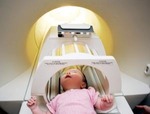In lieu of a DT Friday Freakout, here is the shocking result of a Japanese researcher's 6-month in-depth study of two babies: one sometimes fake cried for attention.
Just over 98 per cent of Baby R's crying episodes were also preceded by negative affect, but there was a single instance at 11 months where her crying immediately followed positive emotion (indicated by smiling or laughing), and then positive emotion abruptly followed the bout of crying. The mother recognised this behaviour as fake crying, and the emotional analysis appeared to confirm this. "Infant R appeared to cry deliberately to get her mother's attention," said Nakayama, "[then] she showed smile immediately after her mother came closer."So the crying is fake, but the attention is real. Maybe if kids learned a few tricks, or some funny jokes, they would not need to fake cry for attention so much.People might have a negative impression of "fake crying" said Nakayama, but they shouldn't do. It attracts the attention of the care-giver, and "such individual interaction contributes greatly not only to an infant's social development but also to their emotional development. Infants who are capable of fake crying might communicate successfully with their caregivers in this way on a daily basis. Fake crying could add much to their relationships."
Systematic evidence of fake crying by a baby [bps-research-digest via @richmintz]

